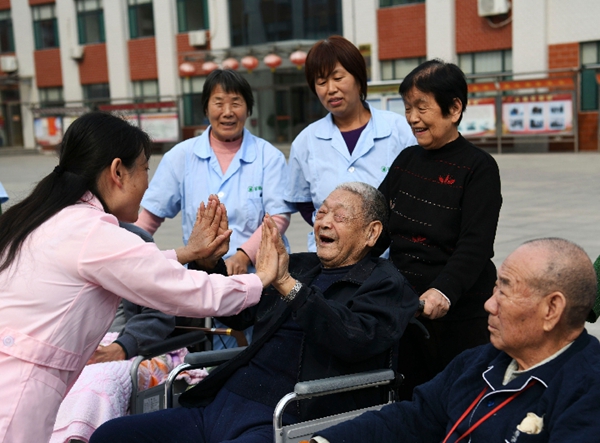Aging population spurs integrated elderly care services
- By Wu Jin
 0 Comment(s)
0 Comment(s) Print
Print E-mail China.org.cn, August 7, 2019
E-mail China.org.cn, August 7, 2019

Feng, a 91-year-old Shanghai woman, has been bedridden for three years since she slipped on a road and suffered fractures. What is worse, last January, she was diagnosed with Alzheimer's Disease, a syndrome that has led to her life being dominated by stomach tubes and catheters.
Meanwhile, her husband, hospitalized due to his poor health, also needs nursing around the clock.
The burden to take care of the senile couple fell on the shoulders of their son and daughter-in-law, who, being in their 60s, also face the problems of aging.
Each time when taking Feng to hospital for medical checks, the younger couple would become so exhausted that they felt as if their life was almost over, too.
Last September, they learnt from a doctor about an online healthcare system enabling nurses to conduct physical checks at a patient's home. Therefore, they booked an electrocardiographic exam for Feng, with a cost only 40 yuan (US$5.8) higher than a normal outpatient service.
In February this year, the National Health Commission (NHC) launched a pilot program - the Internet Plus Nursing Services - in six provincial-level regions including Beijing, Tianjin, Shanghai, Jiangsu, Zhejiang and Guangdong, in an attempt to make use of nurses' spare time to provide door-to-door nursing services. Under the program, discharged patients and disabled people can apply for registered nurses to serve them at home via an online system.
Wang Wenbiao, president of the Aviation General Hospital in Beijing, explained: "Nurses are professionals in checking patients' overall conditions, so they can offer home services regularly to determine if a disease has worsened or is receding, and whether the patients need hospitalization."
According to the NHC, the average life expectancy of Chinese people reached 77 years in 2018, but, healthy life expectancy was 68.7, indicating a huge number of seniors are living with illness for about eight years on average before they pass away. With a population of about 250 million aged over 60, China is challenged by a huge shortage of nurses, whose registered number barely reaches four million.
To address the fundamental problem, Panzhihua city, in Southwest China's Sichuan province, has spearheaded the establishment of a community-level clinic providing online and offline medical services, including regular physical exams and remote diagnoses from general hospitals via an Internet connection.
According to Healthy China Initiative, an action plan issued by the State Council covering the period from 2019 to 2030, the healthcare services provided for seniors should go beyond building more nursing homes or hospitals, and should pool a mixture of social resources to improve the healthcare service system for the elderly, boost home- and community-based elderly care services, provide integrated elderly care and medical services, explore the long-term care insurance system, and ensure healthy aging.
Li Jian'an, former chairperson of the International Society of Physical and Rehabilitation Medicine (ISPRM), a non-governmental organization (NGO) linked with the World Health Organization (WHO), said that, as most apartment buildings in China are not designed especially for the elderly, the society is in need of more elderly-oriented facilities offering integrated elderly care and medical services.
In one of the nursing houses in Xiangtan, Hunan province, 60% of the beds have been occupied by elderly people incapacitated to varying degrees from low to medium, or suffering chronic diseases.
Xiang Mingkai, president of the Xiangtan Sixth Hospital, said treatment for the elderly prone to dementia or incapacitation could absorb all the family savings and lead to destitution. Therefore, Xiang suggested that China should implement long-term care insurances in an effort equal to that in developed countries to prevent ordinary families from being collapsed in face of extremely expensive medical costs.
Li echoed Xiang, saying, "the pensions saved by the elderly should be used to ensure they can live decent lives. We need to think about how to improve the pension finance sector to ensure that the money can be better used."






Go to Forum >>0 Comment(s)